-
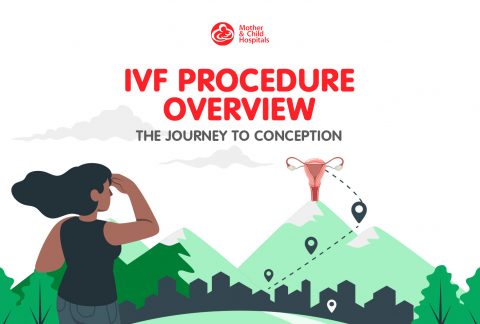
Hope and Joy Through IVF
Infertility Explained
In Vitro Fertilization (IVF) as an assisted reproduction method has brought joy and hope to many couples struggling with infertility.
Here are some of the gains of IVF:
Overcoming infertility: One of the primary joys of IVF is overcoming infertility and fulfilling the dream of having a child. For couples trying to conceive for a long time without success, IVF offers a chance to experience parenthood joys.
Increased chances of conception: IVF significantly increases the chances of conception for couples unsuccessful with other fertility treatments. By combining the sperm and egg in a laboratory setting, IVF bypasses certain fertility barriers. ICSI provides a higher likelihood of successful fertilization.
Genetic screening: IVF often involves preimplantation genetic testing, which allows the screening of embryos for genetic disorders or chromosomal abnormalities. Embryo screening helps identify healthy embryos for transfer, reducing the risk of passing genetic diseases to the child.
Embryo selection: With IVF, fertility specialists stimulate multiple embryos for the woman and select the best quality ones for transfer. Embryo selection gives couples and their healthcare providers more control over the selection process, increasing the chances of a successful pregnancy.
Surrogacy option: IVF can also be combined with gestational surrogacy, allowing couples unable to carry a pregnancy to have a biological child. A gestational surrogate carries the embryo created through IVF, providing a way for intended parents to have a genetic connection with their child.
Emotional support: IVF often involves a comprehensive support system, including medical professionals, counsellors, and support groups. This network can provide emotional support throughout the IVF journey, helping couples navigate the emotional ups and downs and providing reassurance during challenging times.
Building a family: The ultimate joy of IVF is building a family and experiencing the love, joy, and fulfillment that comes with having a child. For many couples, IVF has allowed them to achieve their dream of becoming parents, bringing immense happiness.
It’s important to note that IVF can also be challenging and emotionally taxing, and outcomes may vary for each individual or couple. Having realistic expectations and seeking appropriate medical and emotional support during the IVF journey is essential.
Fruitful Field is the assisted reproduction arm of Mother and Child Hospital that exists to help people have healthy babies through medical interventions. The Fertility Center offers services in Intracytoplasmic Sperm Injection (ICSI), Intrauterine Insemination (IUI), Pre-Implantation Genetic Testing, Transport IVF and more. Click here to register to speak to our consultants or call +2348129209860.
Mother and Child Hospital
-
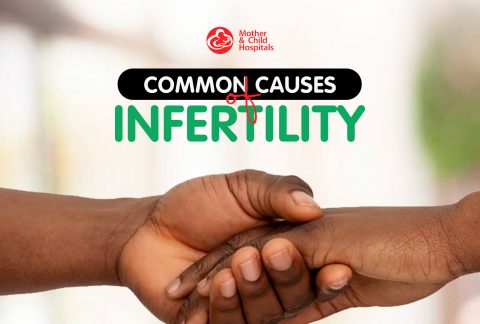
Causes of Infertility
Causes of Infertility
Today, we’re diving into a crucial topic: the common causes of infertility. Infertility can be complex. However, knowledge is power, and understanding what infertility is as well as causative factors can help you navigate your fertility journey with confidence.
Exploring Common Causes of Infertility:
Infertility can be caused by various factors, both in men and women.
1. Age: As we age, fertility naturally declines, with a significant drop after the age of 35. It’s essential to be aware of this factor when planning your family.
2. Medical Conditions: Conditions like polycystic ovary syndrome (PCOS), endometriosis, and hormonal imbalances can affect fertility in women, while issues like low sperm count or motility can affect men.
3. Lifestyle Factors: Smoking, excessive alcohol consumption, stress, and obesity can impact fertility. Making healthy lifestyle choices can significantly improve your chances.
4. Sexual Health: Infections, sexually transmitted diseases (STDs), and certain medications can affect reproductive health. Regular check-ups are crucial.
5. Environmental Factors: Exposure to environmental toxins, such as pesticides or radiation, can harm fertility. Be mindful of your surroundings.
6. Unexplained Infertility: Sometimes, despite thorough testing, the cause of infertility remains unknown. This can be particularly challenging but remember that support is available.
The first step to confirming your fertility status is to conduct a test. For a consultation session with a fertility expert, please call +2348129209860. Visit here to learn more about the Fruitful Field fertility clinic.
Mother and Child Hospital
-
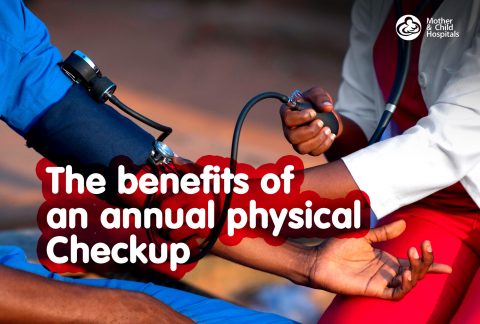
Are health checkups necessary?
Are health checkups necessary?
A healthcare professional should not just attend to you when you are unwell or experiencing symptoms. An annual physical examination may inform you of the state of your health, its trajectory, and how it should be regularly!
A yearly health check-up prepares you for anything that might come up soon and reviews health changes that you may not notice in your day-to-day life.
A Mother and Child health and wellness plan offers you a multitude of benefits:
– Preventive health: Preventative health centers on knowing where you stand with your health to plan follow-up action for your wellness. A physical examination done annually factors in things you may not regularly check. With preventive health, your physician cares for you before an issue becomes challenging to tackle.
– Maintaining Immunizations: The ideal time to bring this up with your doctor is at your yearly physical if you’re behind or want to learn more about the options.
– Lifestyle Knowledge: Your lifestyle appears relatively easy to understand. Even if you believe that you “know yourself inside and out,” it is still essential for your physical and emotional health to discuss your lifestyle with a healthcare provider. Let’s say your stress levels are rising without any apparent physical symptoms. In such a situation, external circumstances such as work and obligations, daily schedule, child care, sleep schedule and eating patterns may impact your health.
– Assessing Your Current Medications: Patients occasionally take medications with the understanding that it won’t be a long-term solution for them. For instance, some individuals use birth control, depression, or anxiety medications to determine later on whether they still need them. However, it’s crucial to understand when, how, and whether you should stop taking medicine altogether.
Generally, an annual physical exam helps you and the medical team, assess your health whether or not you are experiencing symptoms. It points to areas that need attention to prevent major medical emergencies or manage health conditions such as stroke.
To simplify the health check processes, we have created 4 COMPREHENSIVE PACKAGES – OUR BASIC, STANDARD, STANDARD PLUS AND SUPREME HEALTH CHECK PACKAGE.
1. Basic Plan: Physical Blood Pressure Check, BMI, Weight check, Blood count, Blood group, Genotype, Urinalysis, Retroviral screening (HIV), Microscopy, Glucose test, ESR test, DRE test (male), physician review (to explain the results and share follow-up recommendations for your health and wellness). This package costs N40,000.
2. Standard Plan: All Basic Plan: Urine Microalbumin, Hepatitis B & C, Screening, Thyroid function test, Chest X-ray. This package costs N60,000 for males and N70,000 for females.
3. Standard Plus Plan: All Standard Plan, ECG, Pap Smear (female), Breast Scan (female), Stool Occult Blood, H. Pylori Test, Renal Function test (electrolyte, urea, creatine, EGFR HBA1C, PSA(male), Glaucoma Profile Test. This package costs N85,000 for males and N100,000 for females.
4. Supreme Plan: All Standard Plus Plan, Prostate Scan (male), Carcinoembryonic Antigens, Liver function test, Lipid profile. This package costs N160,000.
You can walk into Mother and Child Omole or Adeniyi Jones Monday – Friday, 9 am – 2 pm, for a health and wellness check. You can also call: +2347036202190 (Omole) or +23470683729787 (Adeniyi Jones) for enquiries or booking.
Mother and Child Hospital
-
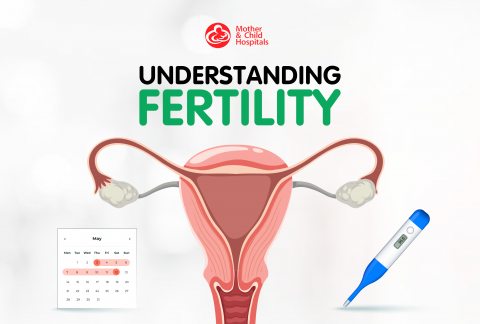
Understanding Infertility
Infertility Explained
What is Infertility?
Infertility affects many couples around the world. It is the inability to conceive after one year of trying for couples under the age of 35 or after six months for couples over the age of 35. Several factors can cause infertility, including hormonal imbalances, anatomical abnormalities, and lifestyle factors. We will examine some infertility causes, its emotional impact, and assisted reproduction treatment options available.
Causes of Infertility
– Hormonal imbalances: Disorders that affect the hormones that regulate reproduction can cause infertility. These disorders include polycystic ovary syndrome (PCOS) and thyroid disorders.
– Anatomical abnormalities: Structural problems with the reproductive system can cause infertility. These problems include blocked fallopian tubes, uterine fibroids, and endometriosis.
– Lifestyle factors: Habits such as smoking, excessive alcohol consumption, and being overweight or underweight affect fertility.
– Age: Women’s fertility decreases as they age because the number and quality of eggs in the ovaries decline.
Emotional effect of Infertility
Infertility can be an emotionally charged experience for couples causing feelings of sadness, frustration, even depression. Many couples also feel a sense of shame or embarrassment about their infertility, which can make it challenging to seek help. The first step to overcoming infertility is understanding the issues, which can be a mix of factors as this post has explained.
Starting a family is beautiful, but it’s not always easy. Mother and Child Hospital Fruitful Field will make that journey smoother with our assisted reproductive services. Our experienced team will provide compassionate care and professional support throughout the process. Let’s work together to make your dreams of growing your family a reality.
To book a consultation with a fertility expert, please call +2348129209860. You can also speak to a Gyneacologist. Please call: +2347036202190 (Omole) or +23470683729787 (Adeniyi Jones). Visit here to learn more about the Fruitful Field fertility clinic.
Mother and Child Hospital
-
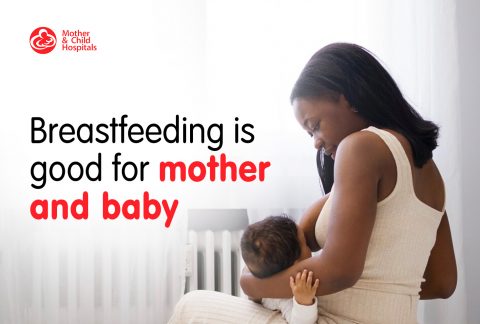
Importance of Breastfeeding
Importance of breastfeeding
Breastfeeding is good for the health of the baby and mum. However, for your baby, breastfeeding is more than just sustenance. Breastfeeding aids in creating a strong, enduring link between you and your child because your little one can feel, smell, see and be close to you while you nurse them.
Breastfeeding may take some time to get used to. It might even be challenging at first. The significance to you and your child, though, makes it worthwhile. You can start and continue breastfeeding with the support of family and friends.
Why is it necessary to breastfeed your baby?
Breastfeeding is your baby’s crucial source of nutrition and liquid and only a mother can give this. Each breastmilk feed fits your baby’s needs and developmental stage. Also, breastfed babies are less likely to get sick than formula-fed ones.
Non-breastfed infants have a higher chance of developing kidney or bladder infections, stomach and bowel illness (including diarrhea), ear infections, allergies (including eczema and asthma), and SIDS (sudden infant death syndrome—cot death).Right from pregnancy, you can ensure proper fetal growth by eating meals rich in nutrients such as carbohydrates, protein, lipids and fats, water, essential fatty acids, fiber, vitamins.
Breastfeeding benefits for nursing mothers
It’s crucial for your health that you breastfeed your child. It can:
1. Make it easier for your body to get back to its pre-pregnancy state
2. Reduce the risk of breast or ovarian cancer
3. Reduce your risk of developing osteoporosis (weak bones) as you age
4. Aids in strengthening your bond with your infant.The breast is crucial for breastfeeding. Care for your breast by cleaning it daily, avoiding breast engorgement by breastfeeding often or expressing, and avoiding cracking of nipple.
Hey Mothers, You Can Do It! You Can Make It Work!
Here are a few tips:
1. Breastfeeding often (8–12 times in 24 hours) and shortly after giving birth.
2. Hold your child close to you.
3. You shouldn’t offer your baby a bottle or pacifier until they breastfeed well.
4. Solely offer breast milk. See breastmilk storage tips here.Our antenatal classes are held every third Saturday of the month at Mother and Child Hospital, where we discuss topics like this and share tips to have a wonderful experience with your baby. Upon conception, our team of experienced Obstetricians, Gynecologists, and midwives will attend to you regularly until birth and after delivery.
We are a renowned maternity hospital, children’s hospital and family clinic. If you’re looking for a top specialist hospital in Nigeria and a top private hospital in Lagos, you’re in the right place. Our consultants are skilled in various medical disciplines, including surgery, obstetrics and gynecology, family medicine, pediatrics and more. We offer timely, comprehensive and outstanding healthcare services to all our clients in an environment filled with love, care and comfort.
To register for antenatal at Mother and Child Hospital, visit any of our two locations.
Omole: 2, Omole Layout, Ogunnusi Road, Ojodu, Lagos State, Nigeria.
Adeniyi Jones: 39 Adeniyi Jones Avenue, Ikeja, Lagos State,
You can also call 07036202190 (Omole) or 07068372987 (Adeniyi Jones).
Mother and Child Hospital
-

Dysmenorrhea: Why do I have painful periods?
Dysmenorrhea: Painful Periods
Many females report having painful periods. Medically, this is called Dysmenorrhea. Period pain might range from mild, aching cramps to severe agony that feels uncontrollable and is challenging to manage.
There are two types of painful periods;
Primary Dysmenorrhea: Unusual contractions of the uterus due to a chemical imbalance in the body. Symptoms are sporadic and painful cramps in the lower abdomen shortly before or at the beginning of menses when there is no pelvic disease.Secondary Dysmenorrhea: It is caused by conditions affecting female reproductive organs, such as Pelvic Inflammatory Disease, Uterine Fibroids, Ovarian Cysts, Sexually Transmitted Infections (STIs) or Endometriosis. It is more common as women age.
The body typically goes through different conditions as a result of hormonal, biological and lifestyle factors. However, severe period pain should be investigated.
Every woman should form a habit of recording her period dates and symptoms because this is important medical information that helps in every consultation with the doctor, including the diagnosis and treatment of Dysmenorrhea.
If you experience menstrual pain that affects your lifestyle, preventing you from being able to work, school or participate in day-to-day activities, speak to your doctor. After discussing this with your doctor, he or she will be able to determine whether any tests or treatments are required.
Here are some details to note before your doctor’s appointment:
- – The first day of your last period (the day your period commenced).
- – How long your period typically lasts for (number of days).
- – Your shortest period cycle (the time between the start day of one period to the start day of another period).
- – The longest cycle of your periods (the longest time between the start day of one period to the start day of another period).
- – The heaviness of your period or how often you have to change daily when the flow is heavy.
- – When you had your last smear test (if you are above 25 years).
Dysmenorrhea treatment may include medications, hormone treatment, birth control pills, diet changes and exercise, heat, or massage. In some cases, surgery may be needed. If you or someone you know is experiencing unusual period pain or flow, please visit any of our two locations at Mother and Child Hospital Omole and Ikeja for a review. You can also book a virtual consultation or call 07036202190 (Omole) or 07068372987 (Adeniyi Jones) for enquiries.
Mother and Child Hospital
-
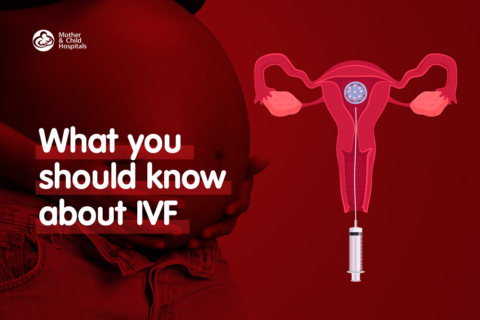
What you should know about IVF
What you should know about IVF
What is IVF?
IVF means In Vitro Fertilization (IVF). It is a form of assisted reproduction in which we retrieve mature eggs from a woman’s ovary, fertilizing them with sperm in a lab and transferring them into a uterus. The stages of IVF are ovulation induction, egg and sperm retrieval, fertilization and embryo transfer. An embryo transfer is the final and most delicate step in the IVF process.
Who can do IVF?
IVF is an infertility treatment. IVF may be recommended for older women trying to conceive because, naturally, their bodies may produce fewer eggs and have difficulty with egg implantation. Egg implantation occurs when a sperm fertilizes an egg and then travels from a woman’s tube to the uterine lining, where it attaches and grows.
IVF is also used to treat certain health conditions in a woman, such as fallopian tube blockage, tubal ligation, Polycystic ovary syndrome (PCOS) causing ovulation irregularities, Endometriosis, and uterine fibroids. For men with low sperm count, poor motility, sperm morphology problems or blockage in the male reproductive tract, a specialist may also recommend IVF.
What are the risks involved?
With IVF, conception is highly likely but not guaranteed. An IVF procedure has significant cost implications, and may have some risks. The fertility center you choose is critical for a higher chance of success and to mitigate risks. A couple that decide to do IVF may experience:
- Multiple babies: Women who go through IVF often conceive twins or triplets. The number of babies is even more in some cases. Using numerous eggs increases the chances that more than one egg will implant, resulting in multiple fetuses.
- Ectopic pregnancy is when the eggs implant outside the uterus instead of inside it.
- Premature delivery and low birth weight: IVF can increase the risk that the mother delivers the baby early and/or that the baby has a low birth weight.
- Miscarriage can occur after IVF at the same rate it may happen in natural conception. One thing to note is that as the mother ages, the rate of miscarriages also increases.
- Complications in the egg-retrieval procedure may result in infection or bleeding.

What determines success?
Your chances of having a healthy baby using IVF depend on many factors. Some of those factors are:
- Age: Women under 35 may have a higher success rate as this is the peak of their fertility. The age factor also applies to a donor. For a man, sperm quality also starts reducing from 35 years.
- Previous pregnancy: A woman has a greater chance of conceiving through IVF if she has been pregnant before and carried her baby to term. On the other hand, a woman who has had recurrent miscarriages may experience challenges conceiving through IVF.
- Infertility Cause: Some medical conditions in a man or woman, including vasectomy, low sperm quality, fibroids, uterine abnormalities, and ovarian dysfunction, may need other treatments, such as surgery or a donor to have a baby through IVF.
- Lifestyle: Smoking by one of the partners significantly reduces the success of conception by IVF. Also, overweight or underweight women have fewer chances of conceiving than people with a normal BMI. Just as proper nutrition is necessary during pregnancy for maternal and child health, people who take adequate nutrition are also more likely to have a successful IVF outcome. The environment one is in also matters, as a healthy environment can influence conception and vice versa.
- The Fertility Clinic: The fertility clinic directly affects the success of an IVF cycle. A good center has the required protocol, technology, laboratory standards, air quality, and experts.
Our IVF clinic at Mother and Child Hospital has a well-equipped lab and seasoned fertility experts to support a successful process. Our experts at Mother and Child Hospital combine care with years of handling infertility, helping couples weigh the options and guiding them in choosing the best course of fertility treatment.
Upon conception, our team of experienced Obstetricians & Gyneacologists, and midwives will attend to you regularly up until birth and after delivery.
The IVF clinic at Mother and Child Hospital runs on Monday, Tuesday, Thursday and Friday from 9 am to 2 pm. Our lab is also running. Please email fruitfulfield@motherandchildhospital.com or call +234 812 9209860 to schedule an appointment.
Mother and Child Hospital
-
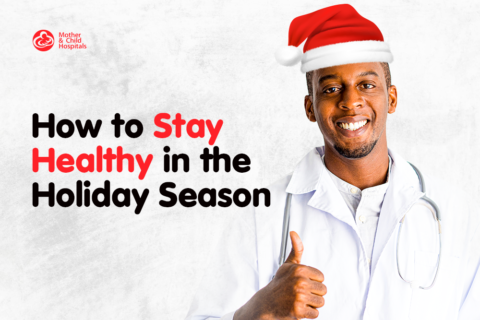
Stay Healthy During the Holidays and Beyond
How To Stay Healthy in the Holiday Season
The Christmas and the end of the Year celebrations present a greater need to stay safe and healthy so that the festivities are not short-lived. So as you make merry with your friends and family this holiday, we have listed some ways you can ensure that both you and them are in top form.
Ways you can maximize the holiday merriment
1. Don’t overeat: Manage your portions, don’t stop only when you feel full.
2. Minimize alcohol intake: Water is always a good idea, whereas alcohol is not.
3. Don’t take medication and drive: Driving or physical activity requires focus, and drugs impair your alertness.
4. Substitute fizzy drinks for natural fruit drinks: Drink your fruits or eat them as they are.
5. Be cautious of your environment: Security is critical. Always pay attention to where you are and who is around you.If you’re concerned about anyone’s health, don’t assume all is well; go to the hospital promptly. We are open 24/7. Visit any of our two locations at 2 Omole Layout, Ogunnusi Road, Ojodu or 39 Adeniyi Jones Avenue, Ikeja, Lagos State. Call us at 07036202190 (Omole) or 07068372987 (Ikeja) for inquiries.
Connect with us on social media for more tips and relevant information. Find us on Instagram, Facebook and LinkedIn.
Mother and Child Hospital
-
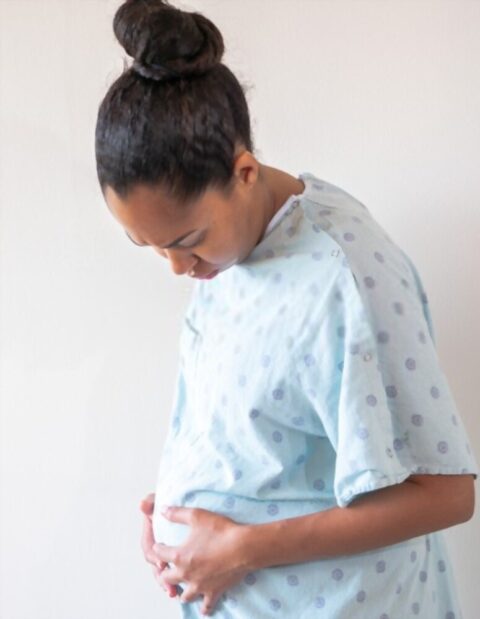
Preventing and Treating Dangerous Signs in Pregnancy
Preterm Contraction and Labour, Antepartum Haemorrhage, Miscarriage, Intra Uterine Fetal Death Although pregnancy is typically marked by certain conditions…
Mother and Child Hospital
-

Pregnancy Conditions
Some of the discomforts experienced in pregnancy are as a result of the two hormones released into the body of…
Mother and Child Hospital
-
-
-
-
-
-
-
-
-

Preventing and Treating Dangerous Signs in Pregnancy
Preterm Contraction and Labour, Antepartum Haemorrhage, Miscarriage, Intra Uterine Fetal Death Although pregnancy is typically marked by certain conditions…
-

Pregnancy Conditions
Some of the discomforts experienced in pregnancy are as a result of the two hormones released into the body of…
